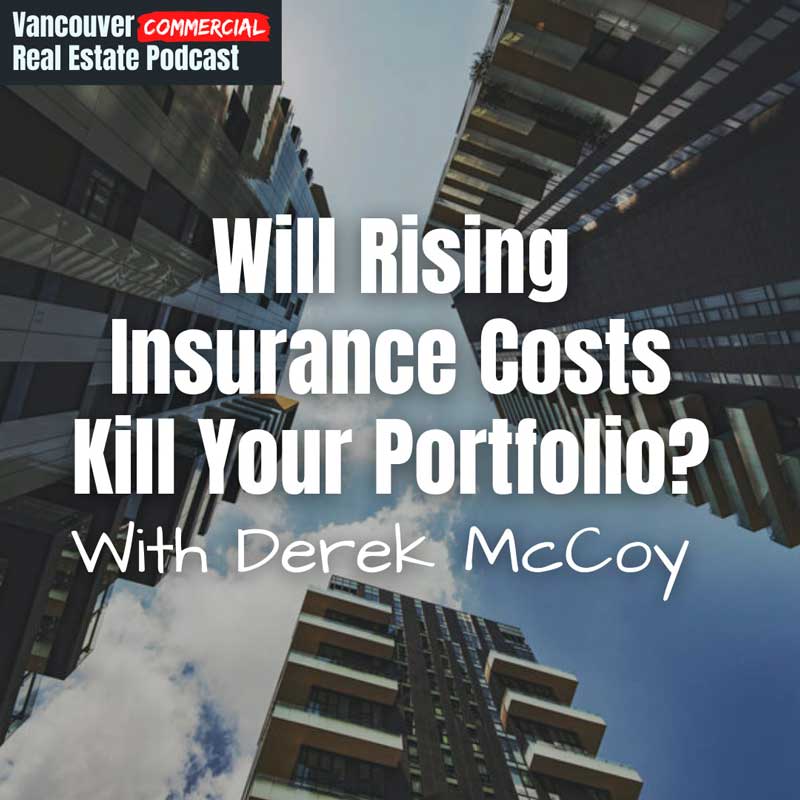
Powered by RedCircle
The world of insurance has faced unprecedented challenges over the last few years, with the result being expensive premiums and deductible hikes that have the potential to destroy your bottom line. Derek McCoy, COO of Real Estate Owners and Managers Insurance Group, sits down with Cory to break down the causes, concerns, and costs of insuring commercial real estate today in BC. What do you need to know before you buy? How can you mitigate against the risks of rising costs? And what are the key factors to watch for in the years to come? Notebooks out!
Please tell us about yourself.
I’m Vancouver born and raised. I’ve been in the insurance game since the early 90’s and with ROMIG (Real Estate Owners & Managers Insurance Group) since the very beginning. I opened it about five years ago. Insurance is not a static industry so it keeps me interested.
Does ROMIG focus exclusively on commercial insurance?
At this point, our portfolio is 99% commercial. I do some residential strata but at this point in time, we’re mostly commercial.
Are you seeing the same changes in commercial insurance as we saw in residential insurance?
At a very high level, they are tied together. There are some similarities. But we’re not seeing quite as drastic changes in commercial as there have been on the residential side. About two years ago, we did see some sticker shock increases but it’s starting to level out.
Why did those increases take place? How has that impacted rates and costs?
Globally, the payouts on these large catastrophes have been huge. When the losses are so big, everyone feels the effects. It starts at the top and trickles down to the consumer. That’s what we’ve seen on the residential side, especially with water losses over the last few years. The commercial side has also been affected, but not to the same extent. But whether you’re residential or commercial, water will always be your biggest issue. So insurers are adjusting policies to limit their liability.
Why have the changes been felt more on the residential side?
There’s less capacity for residential. There are fewer insurers and fewer players in that field. Because the group insuring residential is smaller, they were incurring bigger costs. Some got scared and exited the market, which led to less competition and less capacity. So they needed to reduce their risk and charge more.
In multi-story towers, it’s never just one unit that gets affected by a pipe burst. The size of water damage claims is so much bigger than they would be with a row of townhouses.
How has commercial been impacted by changes in insurance?
Wood-frame has fallen victim to the change of a hardening insurance market. The capacity on that has shrunk, which triggers higher rates and higher deductibles. Now insurers only want to write 40-50% of it, so you have to go elsewhere to fill the capacity.
Are there multiple companies that would share the risk on one insurance policy?
Yes. It can be difficult if you’re looking for insurance. You have to match up everybody so they agree to the same terms. You can have a dozen different insurers who all have a portion of it. It takes some time to negotiate and make sure it all lines up.
Do insurers look to spread their risk around to various asset classes?
Yes, you’ll see this when there’s a hardening of the market. Underwriters may pull out of certain industries.
Who pays these insurance costs?
These costs are passed down through the tenant leases; the tenant funds the insurance costs. I deal with property managers who act on behalf of property owners.
Cory: Most commercial leases are triple-net leases. So this is one of the costs that is passed down to the tenant. You’re working to keep these costs as tight as possible so tenants’ businesses are as strong as possible and not exposed.
What does an ideal commercial building look like?
The newer the better, obviously. Anything younger than 25-30 years is okay. Concrete is more fire-resistant. Fully-sprinklered is a plus. Anything to do with security, like monitored alarms, is good. Fully tenanted buildings help to reduce losses. This all plays well into a professionally managed building; those buildings have better loss ratios.
How do you improve a building you’re already in? How do you mitigate against increasing insurance costs?
If you’re in an older building, insurers want to know when the electrical, heating, plumbing and roof were last updated. Those are the things that they look for. If you can show that those things are updated or are planned for, insurers are okay with it. They just want to make sure you’re maintaining an older building.
Having a snow removal contract in place is important too. You need to do your due diligence and make insurers comfortable providing insurance at a reasonable rate.
Are there certain areas of BC that underwriters are more concerned about?
Earthquakes are a huge part of every property policy. The Lower Mainland has a higher risk than other areas in BC for earthquakes. Anywhere down in the delta, like Richmond, will see higher deductibles and rates. Areas with high flood risk, like Chilliwack, will see higher costs. The Island is at a high risk for earthquakes, so will see higher costs too.
Anywhere inland or interior won’t get charged as much because the risk of earthquakes is lower.
Has anyone ever bought in a high risk area and not been able to get coverage?
I have never come across that.
Does the type of tenant impact the insurance?
It can. Low risk would be professional tenants, like dentists and office jobs. Anytime you have something like woodworking or welding, those will have a higher risk. Some underwriters won’t cover things like that.
Cannabis has become a growing industry in Canada and a few years ago, you wouldn’t be able to get insurance coverage. Recently, more insurers have come around and there are even specialty brokers for cannabis clients. As long as the cannabis business has their ducks in a row and has all of their licencing approved, generally insurers will accept it.
As a landlord and in terms of insurance, is there an additional risk if I bring on a cannabis business as a tenant?
My experience is no. As long as they have all their permits in place, they should be good to go.
What are the increased risks insurers are worried about when it comes to cannabis?
Historically, it has depended on the type of clients the business will serve. But as cannabis has become legal, it’s now a business. There’s not as much fear there. It’s lost most of that stigma.
What is a replacement cost appraisal?
When you insure your building, you need to tell the insurer what it would cost to replace that building today. Without an appraisal, the chances of accuracy are quite low. You hire an appraisal company to take a look and they look at everything. They will look at things like current lumber costs, recent by-laws, etc. You then take that evaluation to an insurer and you come to an agreement on the amount you’ll be ensuring.
Should you have a loss and you’re grossly under-insured, a co-insurance clause will kick in. If you have a total or partial loss and you’re under-insured, you’ll pay a percentage of the loss over the deductible. That’s why an accurate appraisal is so important. You want your replacement costs to be up to date. Most appraisal companies will do a three year agreement, coming out to your property in the following years to give you an updated appraisal.
On the importance of insurance & wisdom for people starting out in commercial real estate:
Don’t overlook insurance. Give it the attention it needs. The only time you’ll find out you don’t have what you need is when you have a loss.
Make sure you’re doing your due diligence in regards to inspections of the building. Little things become big things.
Find out more: www.romig.ca
For all the curious minds interested in commercial real estate investing, grab a coffee and pull up a chair because we have exclusive stories and tips from commercial real estate brokers, investors, developers, economists, urban planners, and everyone in-between. From the successes and failures to the motivations and lessons learned, the Vancouver Commercial Real Estate Podcast is your insight into commercial real estate in Vancouver, Victoria, Kelowna, and beyond.
What's the best real estate market to invest in? What are the commercial real estate asset classes and property types? Hosted by Cory Wright, founder of William Wright Commercial, and co-hosts Adam and Matt Scalena of the Vancouver Real Estate Podcast, our podcast opens the door to real estate investing for everyone from beginner investors to experienced real estate professionals. New episodes are released every Tuesday. Follow the Vancouver Commercial Real Estate Podcast on Apple Podcasts, Spotify, Google Podcasts, or your favourite streaming platforms.

This communication is not intended to cause or induce breach of an existing agency agreement. E&OE: All information contained herein is from sources deemed reliable, and have no reason to doubt its accuracy; however, no guarantee or responsibility is assumed thereof, and it shall not form any part of future contracts. Properties are submitted subject to errors and omissions and all information should be carefully verified. All measurements quoted herein are approximate.
ⓒ William Wright Commercial Real Estate Services 2024
Proudly designed by Burst Creative